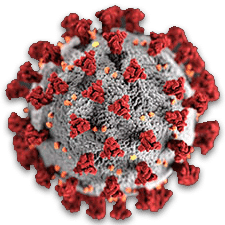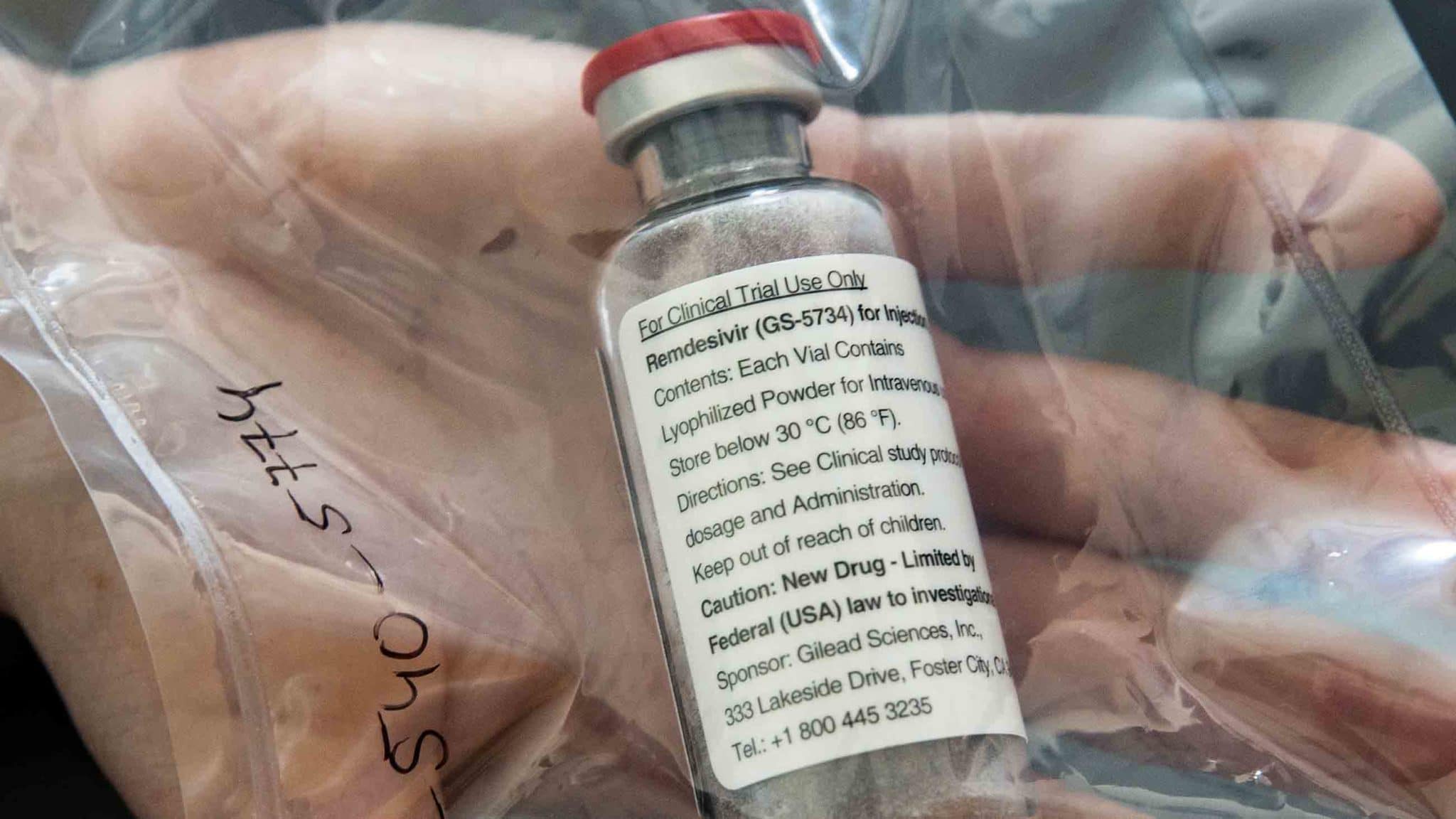As the official U.S. Covid-19 death count surpassed 60,000 people this week, several research developments offered hope that health care workers will soon have new tools to treat the viral disease.
In a Wednesday briefing at the White House, National Institute of Allergy and Infectious Diseases Director Anthony Fauci announced evidence from a new trial indicating that the antiviral drug remdesivir might help treat Covid-19. Public health officials are now seeking approval from the Food and Drug Administration for widespread emergency use of the drug.
Originally touted as a possible treatment for Ebola, remdesivir lagged behind other therapies for the deadly disease caused by that virus. Even before the current pandemic, researchers had begun investigating whether remdesivir could be effective against SARS and MERS, two other coronaviruses that have caused previous global outbreaks. That research program took on new urgency with the emergence of SARS-CoV-2, the virus that causes Covid-19.
This new trial’s findings are relatively modest. Compared to a control group, sick patients treated with remdesivir recovered in a median of 11 days, compared to 15 days without the treatment; 8 percent of them died compared to 11.6 percent in the control group — but, scaled up, the benefits could be considerable. The findings, Fauci said, offered “proof of concept” for remdesivir’s use.
There was promising news this week on other fronts, too. A team based at Oxford University announced that, after a successful test in rhesus macaque monkeys, they would begin testing a coronavirus vaccine in humans at the end of May. And a new federal effort, reported Wednesday by Bloomberg News and dubbed “Operation Warp Speed,” will attempt to fast-track a vaccine by the end of the year.
Whether these efforts will bear fruit is another question. A vaccine that’s effective in monkeys may not work well in humans, and experts have repeatedly warned that a vaccine may not be available until well into 2021. And while remdesivir offers hope, the results are still preliminary. Results from a trial in China, published in The Lancet, did not find significant benefits from the drug. (That trial was smaller than intended, after public health measures in China led to a sharp drop in new SARS-CoV-2 patients, and it did not have statistical power to fully assess the effects of remdesivir).
The Covid-19 pandemic has put the full messiness of scientific inquiry on display — and, in the process, offered many pegs, from hydroxychloroquine to experimental next-gen vaccines, for people to hang their hopes on. As some experts have noted, no single drug or even vaccine is likely to address the full scope of the Covid-19 pandemic, which has revealed fault lines in government infrastructure, the social safety net, and the American health care system.
Hope may also come from the smart application of existing technologies. South Korea this week experienced its first day in months without a new locally-transmitted case of Covid-19 — a milestone achieved largely through an effective use of quarantines, contact tracing, and other old-fashioned epidemiological principles.
In this week’s Abstracts, we continue to offer a roundup of coronavirus themes that defined this week’s news, and that are likely to be relevant in the weeks ahead.
 |
Thoughts or questions on Covid-19? |
• Calls to poison control centers increased this week, after President Trump suggested that injecting chemical disinfectants could treat coronavirus.
In a span of 18 hours, New York City’s poison control center reported 30 cases, more than the same time last year, including nine “specifically about exposure to Lysol, 10 cases specifically about bleach, and 11 cases about exposures to other household cleaners,” according to a health department official. In Michigan, the state poison control center reported that it had received 65 calls regarding exposure to household cleaning products, an 86 percent increase from the past weekend. Meanwhile, the director of the University of Kansas Health System’s poison control center reported a 55 percent increase in calls concerning cleaning products compared to last year. Hundreds of residents of Maryland called the state’s hotline asking whether ingesting disinfectants can treat coronavirus, Gov. Larry Hogan told the press on Sunday. President Trump has defended his comments by arguing they were sarcastic. When asked about the uptick in calls to emergency hotlines, the president responded that he “can’t imagine why” the increase had occurred.
• Glitches continue to plague government aid websites, frustrating small business owners and the unemployed.
“The economy continues to print numbers that scare the living daylights out of everyone in the world,” Chris Rupkey, chief economist at MUFG, one of the world’s largest banks, told Reuters this week, as the U.S. Department of Labor reported 3.8 million more Americans had filed for unemployment benefits in the preceding week. That brought the six-week total to a staggering 30 million — or around one out of every five workers. That frightening figure is likely an undercount, according to a recent survey from the Economic Policy Institute, which estimated an additional 8.9 to 13.9 million Americans would have filed for benefits had the process been easier. Complaints continue to pour in from those unable to file claims as they confront antiquated state websites and jammed phone lines. Even after they submit the necessary paperwork, some people are still waiting for their first payment weeks after filing. And as the Small Business Administration made available a second pot of emergency funds for struggling businesses this week, applicants complained of the same issues that hampered the first round of funding: technical glitches and a lack of clarity about how lenders were prioritizing which businesses received aid. Lawmakers said they will audit any company requesting more than $2 million from the pot and temporarily locked large financial institutions out of the application site in an effort to prioritize smaller businesses.
• New Covid-19 cases emerge in Wisconsin following a controversial election day that brought thousands of voters to the polls.
Following Wisconsin’s much-debated April 7 election — which the state’s Republican Party forced through after a battle that went all the way to the U.S. Supreme Court — critics warned that the state could see an uptick in Covid-19 cases. Walter Shaub, a director of the Office of Government Ethics under former President Obama, described the primary as “sending Wisconsin voters into a war zone.” Last week, state officials reported 19 cases associated with the election; this week, the number topped 50. Still, this represents only a small percentage of the state’s cases. Since election day, Wisconsin’s verified Covid-19 numbers have risen from 2,440 to 6,854, according to the state’s department of health services. The smaller-than-expected bump led Fox News and others to report on a study concluding that the predicted spike did not occur. The National Review, a conservative magazine, reported similar findings, noting that even infectious disease modelers were surprised to see so minor an effect. The results so far are likely to encourage the Republican officials’ continued resistance to absentee ballots and vote-by-mail elections — a debate that’s likely to intensify ahead of this year’s November national elections.
• The number of Covid-19 deaths in Brazil surpassed that of China, as the pandemic spreads across Latin America.
As of this week, Brazil reported more than 5,500 deaths from Covid-19, nearly 1,000 more than have been recorded in China, where the viral disease originated. Despite now ranking ninth among countries with the most deaths, Brazil’s president, Jair Bolsonaro, has continued to minimize the threat posed by the coronavirus pandemic and flout social distancing guidelines. On Tuesday, the country registered 474 coronavirus deaths within 24 hours. When asked by journalists about the mounting toll, Bolsonaro replied: “So what? I’m sorry. What do you want me to do?” While most of the country’s governors have implemented lockdown measures in their states, Bolsonaro has joined protesters who want them lifted. Brazil’s lack of safety measures has officials in neighboring countries worried about the virus’s potential to spread. “Brazil worries me a lot,” Argentina’s president Alberto Fernández told reporters on Saturday. “A lot of traffic is coming from São Paulo, where the infection rate is extremely high, and it doesn’t appear to me that the Brazilian government is taking it with the seriousness that it requires.” Elsewhere in Latin America, Ecuador continues to battle a major outbreak, with the city of Guayaquil struggling to find resting places for the bodies.
• Across the United States, blood banks race to collect plasma from people who have recovered from Covid-19.
“Nearly every blood center in the country has mobilized to help collect convalescent plasma,” said Kate Fry, CEO of America’s Blood Centers, in an interview with Wired. “Thousands of units have already been shipped. We’re hoping for tens of thousands in the coming months.” There is evidence that antibodies in this plasma, from people who have successfully fought off Covid-19, may help treat patients sick with the disease. But there are challenges to meeting the growing demand for blood. Blood centers around cities like New York that were initially hit hard by the pandemic expect to have more eligible donors than they can accept at one time, and plasma collected in the hardest hit cities will need to be distributed to hospitals and treatment centers around the country in the coming months. And recovered patients wanting to donate plasma must first meet strict eligibility requirements — including longstanding restrictions on gay and bisexual men that have been criticized as discriminatory.
There’s plenty of excellent reporting and analysis available.
Below is a list of some of the journalists, experts, and publications that Undark is following.
- Helen Branswell (@HelenBranswell), senior writer, infectious diseases, STAT
- Peter Sandman and Jody Lanard, risk communication experts
- Kai Kupferschmidt (@kakape), molecular biologist and science journalist, Science Magazine
- Trevor Bedford (@trvrb), computational biologist, Fred Hutchinson Cancer Research Center, Seattle
- Lawrence Gostin (@lawrencegostin), professor of global health law, Georgetown University
- Muge Cevik (@mugecevik), infectious disease researcher, University of St. Andrews
- A. Marm Kilpatrick (@DiseaseEcology), infectious disease ecologist, UC-Santa Cruz
- Julia Belluz (@juliaoftoronto), health correspondent, Vox
- Ed Yong (@edyong209), science writer, The Atlantic
- Kaiser Health News, full coronavirus coverage
- ProPublica, full coronavirus coverage
- U.S. Centers for Disease Control and Prevention, latest coronavirus news
- World Health Organization, rolling coronavirus updates
- Global Covid-19 Case Tracker, Johns Hopkins Center for Systems Science and Engineering
- Brief19, a review of Covid-19 research and policy
- The Covid-19 Tracking Project
- The Syllabus, Coronavirus Reading Lists
- Virus Academics Twitter list
Undark will continue to provide weekly roundups of Covid-19 news each Friday for as long as the pandemic continues. You can find our own Covid-19 coverage here.
Deborah Blum, Lucas Haugen, Jane Roberts, Francesca Schembri, and Bettina Urcuioli contributed to this roundup.










